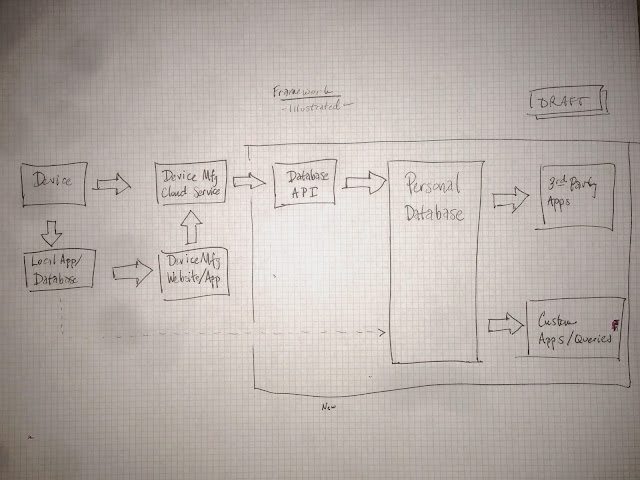- Nest: temperature and thermostat settings
- MiCasaVerde: lighting and other scene settings; garage door opening/closing
- Roku: NetFlix (other sources, too) viewing history
- Fios DVR: TV recording/watching history
- Phillips Hue: lighting/hue
- TED: electricity usage
- Automatic: Automobile efficiency / usage
- Fitbit: personal activity monitor, weight and body fat
- Computers: computer activity monitor
And one future tool(s) that I anticipate using:
- Parrot Flower Power
All of this is great except for one thing: we (as the end customer) don't have control of the data. Our information is spread out among a bunch of different websites being of value only to that particular environment in a way that only they (those running that website) allow. That is not good enough - it has to get better for us.
Here are the issues:
Here are the issues:
- What happens to my data when the manufacturer shuts down or loses interest?
- How can I integrate all of this data into a story or picture of my life?
- How would this control of data to be achieved?
- What should the framework look like?
- Will IFTT ever get off the ground?
Ideal Framework
For the individual to keep control of their data, we have to totally change the paradigm in which we operate. We will need the following frameworks to be in place:
Remote SQL
This should be a protocol that allows external sources of information to post the information to our personal SQL database. This would include not just datum, but the ability to create the tables in which the data was kept. The external entity would never have the right to delete data from these tables, only to change the active or current status of the data (the user would be allowed to change it back if s/he wanted to).
Strong Security
The user would have to be able to manage keys as a routine matter. Therefore, their personal data hosting option would have to be able to create and manage keys.
Infinite Flexibility
There should be no real limitations on what the device databases do, as long as the user has provided the access to the application to do so. Ideally, there would be six to ten simple questions or check boxes for people to click when setting up an app. Each would be labeled as essential (if the app can't function without), or nice to have.Framework Schematics
Here is my initial cut:
Right now, the only boxes that exist are on the left-hand side (and not in all instances)
[Note that Mfg refers to the device manufacturer]
Problems with this Approach
I can imagine that there would be a number of problems with my approach and substantial hurdles to get over.
Speed and Flexibility
The device manufacturers will not likely want to have problems with their app or customer-perceived delays as a result of relying on the information residing in the personal database. As a result, they will likely want to keep the original data on their servers; unfortunately, this would subvert the whole point of giving the customer control of their data.
Who Pays for It
This is always a problem. Who wants to end up having to pay $50/year for data hosting? I would - if it meant that I had control over it. That said, I realize that I'm not a normal user of technology.
Added Complexity
This adds something else to the mix to go wrong - which the manufacturer will likely feel like they will be blamed for even if it is a data hosting problem.
Benefits with this Approach
Lower Startup Costs
There should be fewer things to do / to setup for the manufacturers. Maybe this means its simpler?
Ecosystem Integration
If a device manufacturer has a great, but simple product, they should be able to fit into a bigger world of data with some suggested power means of making somebody's life better.
A Way In
I think that the earliest place where this approach can be taken would be with GPS information. Due to the evolution of the products and the local control of the data, there are several third party applications and strong customer control of their data. I have a Garmin 405 watch that captures both my tracks as well as my heart rate profile. I can take that datafile, upload it to Strava and do what I want with it.
Generally, I don't think that this is going to happen unless customers are effective at forcing it to happen. This will likely only occur when people have woken up to the internet of things. Think IFTT catches fire and the world is clamoring for more control of their digital and real-world lives.


No comments:
Post a Comment